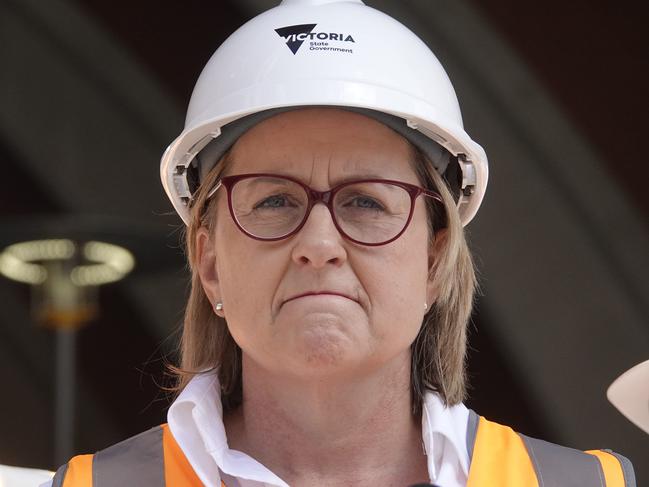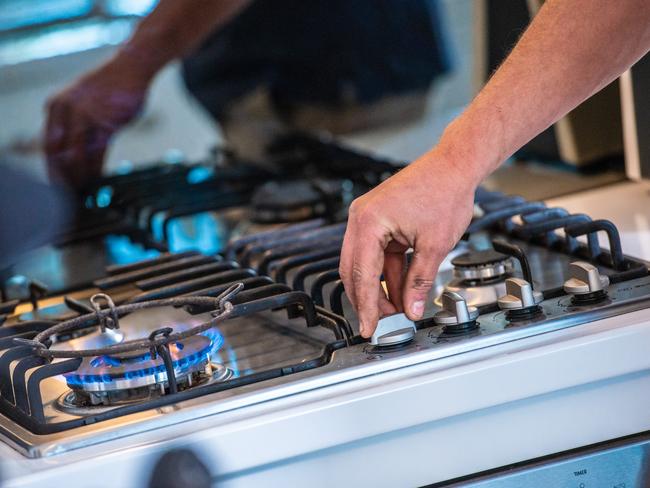Modelling finds gas policy would result in emissions reductions of 18 million tonnes over 20 years at a total consumer cost of $22bn
Victorian households will cop a massive hit to their power bills if the Allan government pushes ahead with a “rushed” move to wean the state off gas in a bid to meet its climate change targets.
Victoria
Don't miss out on the headlines from Victoria. Followed categories will be added to My News.
Forcing households off gas before the power grid is ready for a customer surge could cost households an extra $22bn over two decades, a key energy industry body says.
New modelling commissioned by Energy Networks Australia is being sent to the Allan government to warn of unintended consequences of what it says is its “rushed” electrification of households.
Consequences include more coal and gas plants being switched on for peak demand in winters until 2034, when more renewables and storage will be built into the network, which would offset most emission reductions achieved by using less gas.
The modelling is part of a submission by the ENA, which represents companies operating large poles and wires as well as gas pipelines, to the Allan government’s regulatory impact statement on building electrification plans.

The preferred approach by the government is to push homes and companies off gas by requiring electric appliances to be installed once gas heaters or hot water systems expire.
Last year the government also banned gas connections for new properties needing a planning permit.
But ENA chief executive Dom van den Berg said the government’s “chosen path risked placing undue financial strain on Victorian families”.
“A rushed transition to electrification, without sufficient renewable energy and storage capacity, will lead to higher electricity prices for everyone,” Ms van den Berg said.
“The pressure comes from increasing the overall demand for electricity in the early mornings, evenings and winter peaks – times when people are normally using gas heaters to warm their home and solar and wind are at their lowest output.
“Nearly a quarter of the increased overall system cost is because of increases to the wholesale cost of electricity – and every Victorian pays this, regardless of whether they switch off gas or not.”

The LEK modelling assumes electricity prices are $5/Mwh higher on average under the “forced electrification scenario”, with a wider gap in the early 2030s “when electricity supply is most constrained”.
“There will be greater coal and gas peaker generation to meet the increased electricity demand under the Forced Electrification scenario in the period up to 2034,” it says.
It forecasts total emissions reductions over 20 years of 18 million tonnes, achieved at a total consumer cost of $22bn.
“This equates to an $1222 per tonne of CO2e saved, much higher than alternative abatement options.”
In the ENA submission it argues that a better solution which would also drive down emissions would be to focus on more renewable generation and grid-connected storage, along with accelerating the uptake of electric vehicles.
“The Victorian government is, rightly, worried about emissions however this policy does not make any material difference, at best we might see around a 2 per cent reduction over 20 years, but $22bn is a lot to pay for that,” Ms van den Berg said.
Environment Victoria slammed the ENA modelling as “rubbish”, and said it was about energy giants “protecting their own profits”.
Environment Victoria chief executive Jono La Nauze said sitting back and doing nothing while gas supplies dwindled in a climate crisis was not an option.
“Victoria is running out of gas and all of the new supply alternatives are expensive and environmentally unacceptable,” he said.
“Victorian Energy Upgrades incentives for efficient electric heating save people thousands off the upgrade costs but ENA have ignored this in their modelling.
“Meanwhile, coal is being replaced with wind, solar and storage which are the cheapest options for building new supply.”
Premier Jacinta Allan defended Victoria’s renewables push on Thursday, claiming the submission was based on “completely fanciful assumptions”.
“We’re looking at how we can continue to support gas in this state,” she said.
“The reality is, though, it’s a dwindling supply.
“This is part of the reality we are faced with in this country, a country that for far too long, has been engaged in ideological climate rules, instead of being focused on supporting households and businesses.”
Ms Allan also took a swipe at Peter Dutton’s “astonishing” commitment to roll out nuclear power, calling it an “ideological crusade”.




